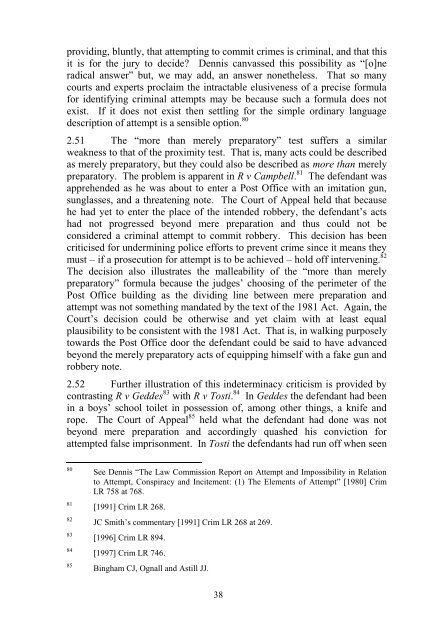Consultation Paper on Inchoate Offences - Law Reform Commission
Consultation Paper on Inchoate Offences - Law Reform Commission
Consultation Paper on Inchoate Offences - Law Reform Commission
Create successful ePaper yourself
Turn your PDF publications into a flip-book with our unique Google optimized e-Paper software.
providing, bluntly, that attempting to commit crimes is criminal, and that thisit is for the jury to decide? Dennis canvassed this possibility as “[o]neradical answer” but, we may add, an answer n<strong>on</strong>etheless. That so manycourts and experts proclaim the intractable elusiveness of a precise formulafor identifying criminal attempts may be because such a formula does notexist. If it does not exist then settling for the simple ordinary languagedescripti<strong>on</strong> of attempt is a sensible opti<strong>on</strong>. 802.51 The “more than merely preparatory” test suffers a similarweakness to that of the proximity test. That is, many acts could be describedas merely preparatory, but they could also be described as more than merelypreparatory. The problem is apparent in R v Campbell. 81 The defendant wasapprehended as he was about to enter a Post Office with an imitati<strong>on</strong> gun,sunglasses, and a threatening note. The Court of Appeal held that becausehe had yet to enter the place of the intended robbery, the defendant‟s actshad not progressed bey<strong>on</strong>d mere preparati<strong>on</strong> and thus could not bec<strong>on</strong>sidered a criminal attempt to commit robbery. This decisi<strong>on</strong> has beencriticised for undermining police efforts to prevent crime since it means theymust – if a prosecuti<strong>on</strong> for attempt is to be achieved – hold off intervening. 82The decisi<strong>on</strong> also illustrates the malleability of the “more than merelypreparatory” formula because the judges‟ choosing of the perimeter of thePost Office building as the dividing line between mere preparati<strong>on</strong> andattempt was not something mandated by the text of the 1981 Act. Again, theCourt‟s decisi<strong>on</strong> could be otherwise and yet claim with at least equalplausibility to be c<strong>on</strong>sistent with the 1981 Act. That is, in walking purposelytowards the Post Office door the defendant could be said to have advancedbey<strong>on</strong>d the merely preparatory acts of equipping himself with a fake gun androbbery note.2.52 Further illustrati<strong>on</strong> of this indeterminacy criticism is provided byc<strong>on</strong>trasting R v Geddes 83 with R v Tosti. 84 In Geddes the defendant had beenin a boys‟ school toilet in possessi<strong>on</strong> of, am<strong>on</strong>g other things, a knife andrope. The Court of Appeal 85 held what the defendant had d<strong>on</strong>e was notbey<strong>on</strong>d mere preparati<strong>on</strong> and accordingly quashed his c<strong>on</strong>victi<strong>on</strong> forattempted false impris<strong>on</strong>ment. In Tosti the defendants had run off when seen808182838485See Dennis “The <strong>Law</strong> Commissi<strong>on</strong> Report <strong>on</strong> Attempt and Impossibility in Relati<strong>on</strong>to Attempt, C<strong>on</strong>spiracy and Incitement: (1) The Elements of Attempt” [1980] CrimLR 758 at 768.[1991] Crim LR 268.JC Smith‟s commentary [1991] Crim LR 268 at 269.[1996] Crim LR 894.[1997] Crim LR 746.Bingham CJ, Ognall and Astill JJ.38
















